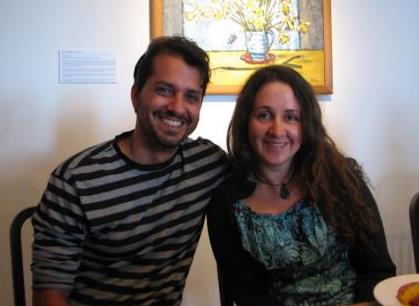Alumni profile: Larissa Kus
30 September 2013

Q. What are you doing now?
A. I am postdoctoral researcher (through the Mobilitas programme) at the Institute of International and Social Studies, Tallinn University, Estonia.
Besides my own Mobilitas postdoctoral research project, The impact of power reversal, social changes, and division between ethnic groups on intergroup relations and subjective well-being, I am currently involved with two other research projects:
The first project Promotion of equal treatment, commissioned by the Estonian Integration and Migration Foundation “Our People”, is investigating reception of the Equal Treatment Act in Estonian society. The results of the study will provide input for the “Strategy of Integration and Social Cohesion in Estonia 2020.”
The second research project, Political and socio-psychological determinants of inclusive integration context and their interdependencies, investigates the interdependencies between political and socio-psychological determinants of inclusiveness of the migrant integration context. The project is linked to the international MIRIPS network (Mutual Intercultural Relations in Plural Societies) led by John W. Berry.
Q. Why did you choose to complete your PhD at CACR?
A. When I was looking for options on where to do my PhD, I was curious to find out which university Colleen Ward was working at as I had read her work for my master’s thesis. I Googled Colleen and found information about CACR online. I became very fascinated by CACR’s profile and decided to find opportunities to study for my PhD at Victoria University of Wellington. My intuition was telling me that this would be a good place to do my PhD and I was not mistaken.
Q. How would you describe CACR to someone who hasn’t studied here?
A. CACR is very good at attracting international postgraduate students from all over the world. This creates a very multicultural social environment making learning much richer, as there is so much to learn from each other’s cultures and topics.
The research topics of the CACR Fellows and Research Associates usually cover areas from very different parts of the world. Therefore it is a big bonus that you get to learn in addition to your own research topic. CACR provides a warm and open atmosphere for academic and social interaction between supervisors and students, making studying very inspiring and motivating.
Q. What would your advice be for new graduate students from CACR?
A. During the PhD process, it’s very easy to get absorbed by the thought that this is an extremely difficult time with lots of hard work. It can feel like a long time without seeing any ‘light at the end of the tunnel’.
However, after finishing a PhD the most important and vivid memories will not be about hard work and difficult times, but rather about things outside your PhD work—sharing good and not so good times with friends and doing different activities together.
Of course working hard is important, but it is equally important to have different experiences outside your PhD. I would encourage everyone to balance their study by doing good activities with colleagues and friends—something that helps you to get through not only the PhD years but will also give you good memories afterwards.
Q. Tell us about an obstacle you had to overcome. What did you learn?
A. There were quite a few obstacles during my years of PhD study, both within and outside the study. Life happens beyond one’s PhD, and there was a period when most of my time and energy went to handling issues of outside of PhD life. It was thanks to the great support from my supervisor Colleen, good colleagues and friends, and Victoria University of Wellington’s support system, that made it possible for me to be “back on track.”
All the obstacles within my PhD writing concerned learning how to better handle self-imposed deadlines without constantly breaking them, how to avoid “drowning” in extensive data analyses, and getting overwhelmed by having to read every single article that is out there relating to my topic.
There was a time I was intimidated by the large amount of research already out there. It made me feel like I was trying to enter an overcrowded room. I concluded that it was not impossible to get through and contribute my own research while respecting the work already completed by other people.
Q. What is your proudest achievement?
A. So far accomplishing my PhD itself is an achievement I am proud of. Read more about Larissa on her CACR profile page here.
